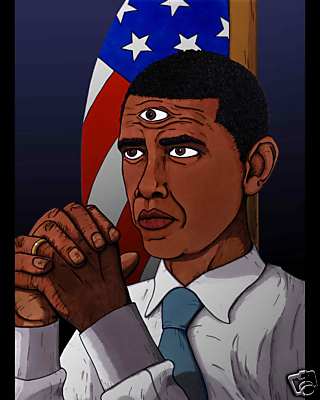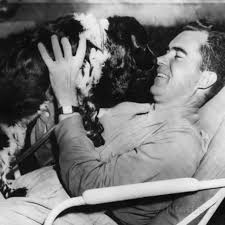Archive for September, 2004
Kennedy – Nixon: the word on the street
Thursday, September 30th, 2004One man in the same bar as Mr. Lally, Callahan’s bar at 235 Flatbush Avenue, refused to give his name but declared emphatically: “So far neither one of these guys has said anything.”
Mr. and Mrs. John F Kennedy of Stuyvesant Town — and no relation to the Democratic candidate — said they did not watch the debate. “What show you talking about? asked Mrs. Kennedy when asked for a comment. “Oh, the television show. We were out visiting.”
Many of the first, quick samplings showed that a considerable number of voters were apparently far from making any vote decision yet.
“For tonight, I’d say Senator Kennedy was the better TV performer,” said Louis Votino, a teacher. “Would he be a better president? I don’t know. I don’t think either one was too articulate. The debate has not changed my mind at all. I’m still unconvinced.”
“The program was very upsetting,” said Virginia Lichtner. “Nixon seemed more interested in presenting a pleasant facade: everytime he spoke he seemed to end it with a little smile. He seemed to say, ‘Yes, I want more education,’ but he wouldn’t say how he was going to get it. Kennedy seemed to have a quicker mind.”
Dan Rosenbloom said: “I think Mr. Nixon did a very good juggling act. He made it sound as if the Administration was doing everything the people want. Mr. Kennedy impressed me as someone who is just trying to get across some of the things he failed to help get through the Congress. Neither impressed me too much.”
A partisan group of about 400 persons called by the Citizens for Kennedy, was gathered at the Delmonico Hotel to watch the debate. The audience of Democrats was restrained, but when some of them thought that Mr. Nixon looked uncomfortable or pressed by Senator Kennedy in the political exchange they would cheer or applaud.
Even there, however, there was a general satisfaction that the debate was showing the voters both candidates in a face-to-face challenge. Mrs. Nona Dowd called it a “wonderful program for both of them” and said that she thought they were both pretty close to each other on ideas.
Alvin Hellerstein, an attorney, watched with the same group. He said he thought that Mr. Kennedy had given an appearance of great vigor and seriousness but that Mr. Nixon had seemed to be talking down to the people.
Cheers and applause Mr. Nixon echoed* at the Federal Republican Club, where about 125 party members had gathered. General silence greeted Mr. Kennedy when he was in view on the screen.
Bernard Newman, New York County Republican leader said: “Mr. Nixon’s maturity and experience showed through clearly and unmistakenly while Mr. Kennedy seemed to want to be all things to all men on all issues.”
To Nicholas Atlas, former Assistant United States Attorney, Senator Kennedy appealed to nostalgia. “He was talking to the generation that was gone,” Mr. Atlas said. “The New Deal is behind us.”
Both candidates appeared well-informed in the opinion of Mrs. Anne J. Mathes, a lawyer. “But Kennedy was emotional and seemed scared,” she said, “while Nixon struck to the point and was logical.”
Mrs. Jesse Lehman said: “I was surprised at Mr. Nixon’s very defensive attitude. he seemed to justify his position on the basis of the fact that Mr. Kennedy agreed with him. Mr. Nixon said very little effectively. Mr. Kennedy was very forthright. I was pleasantly surprised at the way he handled himself. I thought he was outspoken, clear and to the point.”
Not everyone was satisfied with last night’s political substitute for the usual far of entertainment. One woman reached by telephone said she watched the first half of the program, and then fell sound asleep.
A rubbish collector, John Marrone, was sold on Senator Kennedy. “I like his stand on old-age pension and all that stuff,” he said. “And I don’t like Nixon. Those Republicans don’t live up to their promises.”
There was some disappointment over the absense of oratorical fireworks. Some viewers said they had not been expecting so much politeness between the two candidates. Jerome I. Levine said: “There wasn’t much said. They kept repeating over and over that ‘it’s a matter of mean.’ They were both very impressive and seemed to have firm convictions. But there were too many generalizations. It seems they were just being very nice to each other.”
“I thought that Nixon was more effective,” said Mrs. Thomas Madigan. “He wants to keep the Federal Government out of the affairs of state government. […]”
Mrs. Henry Mason liked the show and thought there should be more like it, but she offered no estimate of which of the two candidates had impressed her the most. “I wouldn’t want to commit myself,” she said.
Florence Mervis thought the debate was “very good” and that “Kennedy showed up much better than Nixon.” However, she doubted that it had added anything to her understanding of the issues.
A housewife with two children in high school thought the program and the others to follow would have a definite influence on her vote. “The personality of the men showed through,” said Mrs. Jerome Gilbert. “They could reach me where they never could have otherwise.”
Three quarters of the people at a listening house party in Montclair, NJ felt that Senator Kennedy had the better of the debate. Many thought the Vice President seeemed nervous, but there were some who thought that this was a deliberate affectations.
Most of the group at the party felt that Senator Kennedy not only introduced most of the concrete points of the program in his presentation but also accounted best in the give and take. “Kennedy looked less like Henry Aldrich,” said one of the guests, a Columbia University professor.
“I resent the fact that Nixon has lost his jowls and Kennedy seems to have picked them up,” said a housewife and member of the League of Women Voters.
“I think Nixon showed up remarkably well in the question and answer period,” said one housewife. “He looked particularly well when he was asked to comment on what he had contributed in the way of concrete program to the achievements of the Eisenhower Administration in the last eight years.”
…*Their typo, not mine. I made some minor edits all around, and shifted paragraphs into each other.
Enter the Spin Room
Wednesday, September 29th, 2004The pro-Lincoln Chicago Tribune commented:
“The Ottawa debate gave great satisfaction to our side. Mr. Lincoln, we thought, had the better of the argument, and we all came away encouraged also.”
The pro-Douglas Chicago Times also had its say. In headline style, it told its readers:
THE CAMPAIGN
Douglas Among the People!
Lincoln Breaks down.
Enthusiasms of the People!
Lincoln’s Heart Fails Him!
Lincoln’s Legs Fail Him!
Lincoln’s Tongue Fails Him!
Lincoln Fails All Over!
The People Refuse to Support Him!
The People Laugh at Him!
Douglas the Champion of the People!
That was how it was in Chicago on August 22, 1958, the day after the first debate.
At one point during the debates, Douglas told a crowd that Lincoln had been a storekeeper who sold whisky at one time. Lincoln replied:
“But the difference between Judge Douglas and myself is just this, while I was behind the bar he was in front of it.”
The Debates of Yore: SIGH
Wednesday, September 29th, 2004I’m googling for an old George Will editorial, wherein he states that sighing cost Al Gore the election, but since Gore was incapable of not sighing it’s the natural course of events and so no coaching could do anything about the Gore sigh.
I recall watching the Fox News coverage following the grand debates: When he brought up the name of a bill that he supported to support his case, he was alienating the viewer with his wonkishness. We can’t have specifics, you see…
… though, a lack of specificity would show that the candidate not preferred has no concrete solutions.
According to the months old Atlantic Monthly article, the 1994 George W Bush on display in the Ann Richards debate was a much more articulate, superior version than the 2000 or 2004 version of him. He’s a Brilliant MINIMALIST, you see.
… brilliant… minimalist…
(The “Memorandum of Understanding” was designed to tear down the devastating attacks that John Kerry used to defeat William Weld in the 1996 debates: no props. The “Memorandum of Understanding” also disallows direct challenges — also known as debate.)
The word on the street: expect Bush to use the phrase “minimalize” in relation to Osama Bin Laden (“We’ve… minimalized… them”). And, in relation to minimalization: the word from the experts is that the two-minute byte format works for Kerry, because it forces him to work on the concise and eliminate the Kerryism effect.
Ye shall see. Shan’t we?
Is 17% the Floor?
Wednesday, September 29th, 2004I suppose this throws the Alan Keyes campaign completely off stride. How do you proceed with the strategy of making a stupid-ass comment once or twice a week, a strategy that has been working brilliantly thus far, when you’re stuck answering questions about your daughter’s sexuality?
The question, of course, being Is your daughter a real Lesbian or merely a LUG? (Mr. Keyes, undoubtedly, prays to Jesus that it’s the latter.)
AND… Compare and contrast her hedonism with that of your Mary Cheney’s.
As for Ms. Keyes: she’s removed some stuff from her blog since the controversy hit. Some of the more pertinent, and personal, stuff can be found VOCAL ANTI-GAY KEYES IS PARENT OF A “SELFISH HEDONIST.”, 9-28.
From the comments section there, of a Keyes-supporter:
Basically, I am not surprised that Maya Keyes is gay. It was a suspicion that I have had but I never thought it would be appropriate to raise that question in a blog. When I saw Maya at the Keyes announcement in August, she was indeed wearing all kinds of rainbown bracelets, etc and that just struck me as odd for the daughter of Alan Keyes to be wearing that. So that is where the suspicion began.
Yeah, that would maybe give it away.
This is another of those great “blog triumphs”. (A rather lame “triumph”, considering the circumstances of the Keyes family, and the fact that the Keyes campaign is a non-factor beyond comedy relief.) Tom Daschle may have taken a pass on Trent Lott’s comments regarding Strom Thurmond, but Joshua Micah Marshall bounced it back and brought down Trent Lott from Senate Majority Leader. The Republican blogs brought down Dan Rather by declaring the kernings for some memos not compatible with Vietnam-era documents. (In the case of South Korea, they elect their prime minister, who is spurred to power off of Internet grass roots.) And this time… well, it all starts with Ms. Keyes’s blog.
The Battle for the Wiki
Tuesday, September 28th, 2004The Wikipedia is an online user-created encylopedia where ideological and factional debates fight for the heart and soul of the content.
Don’t like the content? Dispute it. And the denziens of judgement will push it through a path toward alteration.
Something I posted online became the basis for an entry. And, as you can see, the dispute over whether to keep it online or dump it raged on for a while: the sides were “Yes, barely. Keep.” to “Sheer Idiocy. DUMP!”
I notice, from bloglines, that the two sides over the facts and basic tenor for the entry on Lyndon LaRouche are currently being disputed. Thus, we find revision after revision after revision, and a wikipedia entry in complete limbo.
I can’t say that I’m terribly interested in the content, but I find the process a little fascinating. Just try to give a “neutral point of view” on a political cult figure / truth-teller. And try to convince two sides of the correct “facts” that matter and / or actually exist.
You could pare it down to its most noncontroversial elements. But, the LaRouche Youth Squad would demand nothing short of a glorified portrait. (And if you wish to parallel it to something more understandable, replace “LaRouche” with “Reagan” and the fight to get something named after Reagan in every county in America.) Vice-versa too, I suppose.
Stupdifying Moments from the 2000 Debates
Tuesday, September 28th, 2004What Ralph Nader was fighting in 2000 and what Ross Perot was fighting in 1996.
BUSH: Yeah, I agree. I just — I think there has been — some of the scientists, I believe, Mr. Vice President, haven’t they been changing their opinion a little bit on global warming? A profound scientist recently made a different —
MODERATOR: Both of you have now violated — excuse me. Both of you have now violated your own rules. Hold that thought.
GORE: I’ve been trying so hard not to.
MODERATOR: I know, I know. But under your own rules you are not allowed to ask each other a question. I let you do it a moment ago.
BUSH: Twice.
MODERATOR: Now you just — twice, sorry. (LAUGHTER)
GORE: That’s an interruption, by the way.
MODERATOR: That’s an interruption, okay. But anyhow, you just did it so now —
BUSH: I’m sorry. I apologize, Mr. Vice President.
MODERATOR: You aren’t allowed to do that either, see? (LAUGHTER) I’m sorry, go ahead and finish your thought. People care about these things I’ve found out.
BUSH: Of course they care about them. Oh, you mean the rules.
MODERATOR: Yeah, right, exactly right. Go ahead.
BUSH: What the heck. I — of course there’s a lot — look, global warming needs to be taken very seriously, and I take it seriously. But science, there’s a lot — there’s differing opinions blah blah blah…



